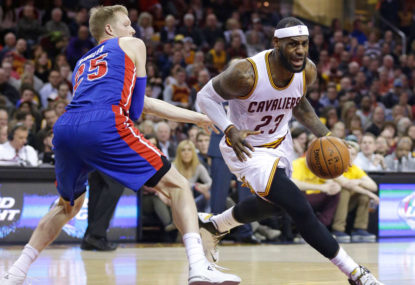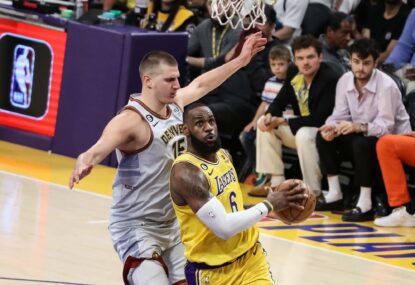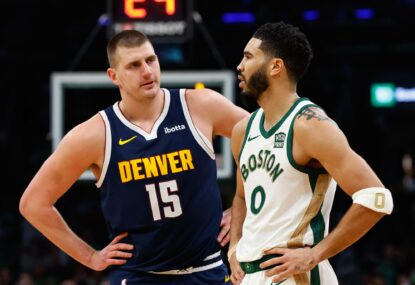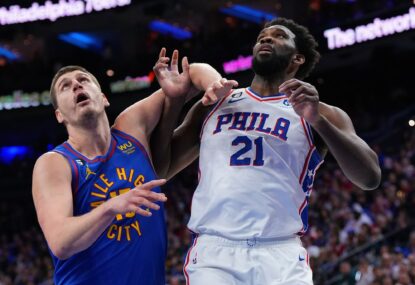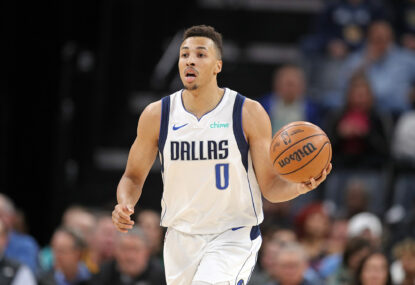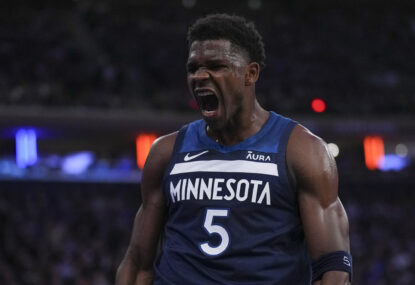The NBA has paused for the All Star game, and it’s a longer pause than usual this season.
If you believe this article, LeBron James had a bit to do with this change, lobbying Commissioner Adam Silver for an extended relaxation period before the season’s home straight.
The break provides an opportunity to reflect on what has happened and what may happen as the season moves towards its crescendo.
This season is as even as any in recent memory, with as many as six legitimate title contenders – Atlanta, Memphis, Golden State, Chicago, San Antonio and Cleveland. And that’s dismissing Dallas and Portland, who could make deep playoff runs.
Of the contenders, who is better to analyse than Cleveland? The Cavs have the worst current record of these contenders at 33-22 and they own a less than impressive 13-13 record against teams currently above 0.500.
They are coached by a man with a fantastic reputation outside of the NBA but who has to juggle egos, expectations and everything that comes with both and signs of friction have appeared already.
The off-season
The Cavs made news in the off-season when James chose to return home. The preeminent NBA player in today’s game, a point guard in a power forward’s body and the man who took his former team to the NBA Finals in four consecutive seasons decided he was done with South Beach.
Not only did James return to join budding star Kyrie Irving, he was joined by All Star and Olympic teammate Kevin Love in what many saw as the new, improved Big 3.
With these three on board, Ohio natives must have thought they were a sure thing to finally bring a title to a state starved of professional sporting success.
The shaky start
The season started shakily as the Cavs found cohesiveness difficult and a 109-102 loss at Phoenix on January 13 saw them with a 19-20 record. The Phoenix loss ended a 10 game stretch where Cleveland won just once, averaging just 90.5 points per game and conceding 102.6 as they lost six games by double figures.
During this period James missed all but two games and quite simply Cleveland couldn’t cope, raising questions about the ability of Irving and Love to shoulder the load, and generating considerable pressure on rookie coach David Blatt.
The numbers
While the Cavs rank sixth in offensive rating and sixth in effective field goal percentage, they are a mediocre 24th in defensive rating. The defensive issues have been particularly prevalent in the key as they concede 61 per cent shooting to opponents within five feet of the basket, which ranks in the bottom five in the league.
Outside of James, Iman Shumpert and the rarely used Shawn Marion it could be argued that Cleveland have no above-average defenders. While all can guard smaller players, none can guards the elite big men of the NBA.
The trade activity
Cleveland sought to address this issue by acquiring Timofey Mozgov from Denver. Mozgov has provided a boost at centre averaging 10.7 points, 8.3 rebounds and 1.6 blocks while having an above-average offensive rating when measured against other NBA starting centres. However defensively he ranks in in the bottom third of centres in defensive rating and usage, although the usage rate ranking is hardly a surprise given he shares the court with James, Love and Irving. With Anderson Varajeo out for the season with injury, Mozgov shapes as a critical component of any Cavalier success.
The Cavs didn’t stop their trade activity there, acquiring J.R.Smith and Iman Shumpert from New York in early January. Smith is an elite streak shooter and has filled the starting shooting guard role since joining Cleveland, ranking in the top 15 among guards for offensive rating and perhaps surprisingly recording an above average defensive rating.
Shumpert provides the Cavs with a strong perimeter defender who ranked in the top 20 in defensive ratings among guards in 2013-14, but hasn’t reached those heights this season as he has struggled with injuries. Provided he stays fit, he will be relied upon to spell both Smith and Irving and will be expected to lead a below-average defensive team.
The depth
Beyond these key additions, the Cleveland rotation looks limited. Tristan Thompson ranks 33rd in overall rebounding percentage and third in offensive rebounding percentage, but along with Mozgov ranks in the bottom 15 in defensive rating for centres that have played more than 20 minutes a game. Given Love is also a below-average defender, Cleveland face a challenge if they choose to play two of these three down the stretch.
Marion is playing just 16 minutes a game off the bench and while he was signed with the expectation of delivering post-season excellence, one wonders where he fits in the swingman glut created with the additions of Smith and Shumpert. Once an elite defender, Cleveland will expect him to improve his below-average 2.6 net rating and dreadful 27.9 three-point shooting percentage.
The Big 3
Cleveland went all-in on Love, trading away the last two number one draft picks in Andrew Wiggins and Andrew Bennett for a player with elite offensive statistics but who has never played a playoff game let alone progressed deep into the post-season. It is hardly a surprise that Love’s usage rate is a career low 22.1 per cent, down on his 10th ranked rate of 28.1 per cent last season.
Of more concern is that his field goal and three-point shooting percentage are well down, while his defence remains a weakness.
Interestingly Love has a net rating of 17.4 when Cleveland wins and -15.0 when they lose, which seems to fly in the face of the perception that he was a dominant performer in a poor Minnesota team who was often more interested in padding his own stats than winning.
Irving has played all but one game and excelled offensively, rating third in the league in both offensive rating and effective field goal percentage, and sixth in offensive efficiency among regular starters. However his defensive rating rates as the sixth worst among guards and is far inferior on the road than it is at home.
The biggest question mark over both Irving and Love is how they will handle the playoffs, especially on the road, given they are devoid of playoff experience and both below average defenders.
The last of the Big 3 is James, whose points and rebound averages are at career-lows, while his shooting percentage is under 50 per cent for the first time since the 2008-09 season. Furthermore his turnovers are at a career high and both his offensive and defensive ratings have slipped.
The one thing you cannot question about James is his playoff pedigree; he remains the best player on the planet and one whose post-season record exceeds his stellar regular season numbers in almost all statistical categories.
The scenario
History is against the Cavs in their quest to claim the franchise’s first title. No NBA champion has had a bottom-10 rated defensive efficiency nor a bottom-10 opponent field goal percentage and Cleveland possess both. Few title hopefuls have entered a post-season with so many flaws, reliant on so many one-dimensional players and with so little post-season experience.
When they can spread the floor with Irving, Smith, James, Love and Mozgov/Shumpert (but hey let’s be honest, Jack Haley could play effectively with those four guys) the Cavs far exceed what any other team can muster offensively; however at least three of those players are below average defenders and will struggle to contain any level of inside presence.
Of all Cleveland’s strengths the only one that looks to be able to stack up against historical post-season evidence is the presence of James. You would be a fool to bet against him and the Cavs enter any playoff series comfortable in the knowledge that they have the best player on the floor, but will it be enough in perhaps the highest quality NBA season of our era?





























































































